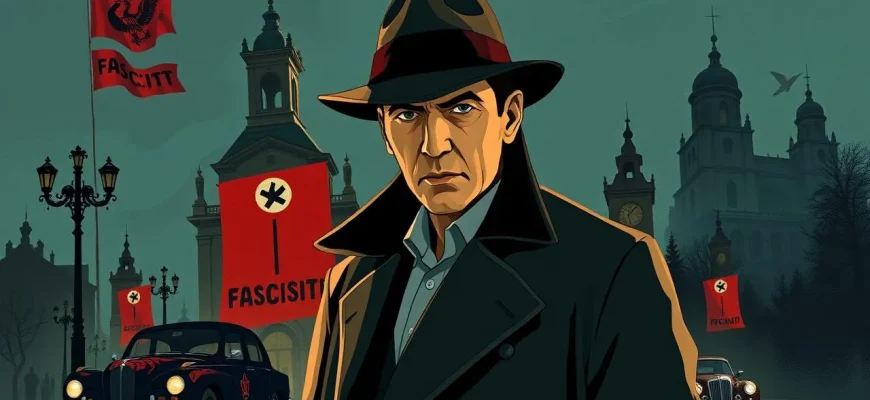This curated list of detective films offers a unique blend of mystery and historical context, focusing on the chilling backdrop of fascism. Each film not only entertains but also educates, providing a window into the political and social turmoil of the era. Whether you're a fan of detective stories or have an interest in historical narratives, this collection promises to captivate and enlighten.

The Night Porter (1974)
Description: This film delves into the psychological aftermath of fascism, focusing on the relationship between a former SS officer and his concentration camp victim, now reunited in post-war Vienna. It's a complex exploration of guilt, trauma, and the lingering effects of fascism.
Fact: The film's controversial subject matter led to it being banned in several countries, sparking debates about the ethics of depicting such relationships.
 Watch Now
Watch Now 
The Odessa File (1974)
Description: A journalist investigates the Odessa organization, a secret network of former SS members, uncovering a plot to revive the Nazi regime. This film blends detective work with historical intrigue, highlighting the persistence of fascist ideologies.
Fact: The film is based on a novel by Frederick Forsyth, who himself was a journalist investigating similar real-life organizations.
 Watch Now
Watch Now 
The Boys from Brazil (1978)
Description: A Nazi hunter uncovers a sinister plot by Dr. Josef Mengele to clone Adolf Hitler and raise these clones in environments similar to Hitler's childhood to recreate the conditions for fascism's rise.
Fact: The film features Gregory Peck in a rare villainous role, showcasing his versatility as an actor.
 Watch Now
Watch Now 
The Lives of Others (2006)
Description: While not directly about fascism, this film explores the oppressive surveillance state of East Germany, which shares similarities with fascist regimes in its control over citizens' lives. A Stasi officer becomes involved in the lives of the people he's spying on, leading to a moral awakening.
Fact: The film was shot in Berlin, with many scenes filmed in actual locations used by the Stasi.
 Watch Now
Watch Now 
The Book Thief (2013)
Description: Set during World War II, this film follows a young girl in Nazi Germany who finds solace in stealing books and sharing them with the Jewish man hiding in her basement. It's a poignant look at the human spirit under the shadow of fascism.
Fact: The film's narration is done by the character of Death, providing a unique perspective on the events.
 Watch Now
Watch Now 
The Reader (2008)
Description: This film explores the aftermath of the Holocaust through the relationship between a young man and an older woman, who turns out to have been a guard at a concentration camp. It delves into themes of guilt, complicity, and the legacy of fascism.
Fact: Kate Winslet won an Academy Award for Best Actress for her role in this film.
 Watch Now
Watch Now 
The Counterfeiters (2007)
Description: Based on true events, this film tells the story of a Jewish counterfeiter forced to work in a Nazi concentration camp to produce counterfeit money to destabilize the Allied economies. It's a tale of survival, resistance, and moral dilemmas under fascism.
Fact: The film won the Academy Award for Best Foreign Language Film, highlighting its critical acclaim.
 Watch Now
Watch Now 
The Conformist (1970)
Description: This film follows Marcello Clerici, an Italian man who becomes an agent for Mussolini's secret police to assassinate his former professor, a political dissident. The plot weaves through themes of identity, conformity, and the moral decay under fascism.
Fact: The film was shot in Paris and Rome, with scenes meticulously recreating the 1930s. It was also nominated for an Academy Award for Best Adapted Screenplay.
 30 Days Free
30 Days Free 
The Eichmann Show (2015)
Description: This film dramatizes the production of the televised trial of Adolf Eichmann, one of the major organizers of the Holocaust. It's a detective story in its own right, as the filmmakers uncover the truth through the trial proceedings.
Fact: The film was inspired by the real-life events surrounding the trial, which was one of the first major televised trials, bringing the horrors of fascism into living rooms worldwide.
 30 Days Free
30 Days Free 
The Damned (1969)
Description: Set in Germany during the rise of the Nazis, this film explores the decadence and moral corruption of the Essenbeck family, industrialists who become entangled with the Nazi regime. It's a chilling portrayal of how fascism can infiltrate and corrupt family dynamics.
Fact: The film was controversial for its depiction of Nazi sympathizers and was banned in Germany for a time due to its portrayal of historical figures.
 30 Days Free
30 Days Free 








